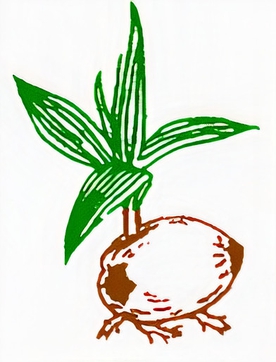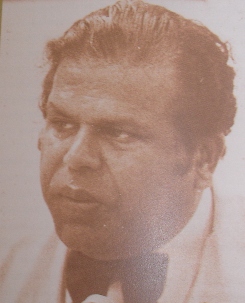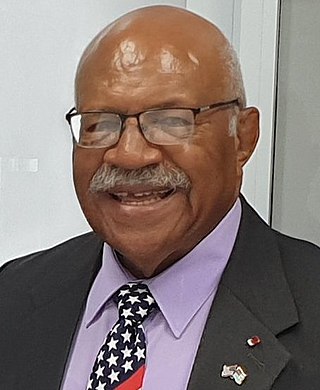Related Research Articles

Mahendra Pal Chaudhry is a Fijian politician and the leader of the Fiji Labour Party. Following a historic election in which he defeated the long-time former leader, Sitiveni Rabuka, the former trade union leader became Fiji's first Indo-Fijian Prime Minister on 19 May 1999, but exactly one year later, on 19 May 2000 he and most of his Cabinet were taken hostage by coup leader George Speight, in the Fiji coup of 2000. Unable to exercise his duties, he and his ministers were sacked by President Ratu Sir Kamisese Mara on 27 May; Mara intended to assume emergency powers himself but was himself deposed by the military leader, Commodore Frank Bainimarama.

The Fiji Labour Party, also known as Fiji Labour, is a political party in Fiji. Most of its support is from the Indo-Fijian community, although it is officially multiracial and its first leader was an indigenous Fijian, Dr. Timoci Bavadra. The party has been elected to power twice, with Timoci Bavadra and Mahendra Chaudhry becoming prime minister in 1987 and 1999 respectively. On both occasions, the resulting government was rapidly overthrown by a coup.

The United Fiji Party was a political party in Fiji. It was founded in 2001 by Prime Minister Laisenia Qarase as a power base; it absorbed most of the Christian Democratic Alliance and other conservative groups, and its endorsement by the Great Council of Chiefs (Bose Levu Vakaturaga) caused it to be widely seen as the successor to the Alliance Party, the former ruling party that had dominated Fijian politics from the 1960s to the 1980s. It drew its support mainly from indigenous Fijiians.

Timoci Uluivuda Bavadra was a Fijian medical doctor who founded the Fiji Labour Party and served as the Prime Minister of Fiji for one month in 1987.

The Great Council of Chiefs is a Fijian constitutional body. It previously existed from 1876 to March 2012 and was re-established in May 2023.

Siddiq Moidin Koya was a Fijian politician, Statesman and Opposition leader. He succeeded to the leadership of the mostly Indo-Fijian National Federation Party (NFP) on the death of the party's founder, A. D. Patel, in October 1969, remaining in this post until 1977. He later served a second term as leader of the NFP, from 1984 to 1987.

Sitiveni Ligamamada Rabuka is a Fijian politician, sportsman, and former soldier who has been serving as Prime Minister of Fiji since 24 December 2022. He was the instigator of two military coups in 1987. He was democratically elected as Prime Minister of Fiji, serving from 1992 to 1999, and again in 2022, leading a three-party coalition. He also served as Chairman of the Great Council of Chiefs from 1999 to 2001, and later as Chairman of the Cakaudrove Provincial Council from 2001 to 2008.

The National Federation Party is a Fijian political party founded by A. D. Patel in November 1968, as a merger of the Federation Party and the National Democratic Party. Though it claims to represent all Fiji Islanders, it is supported, in practice, almost exclusively by Indo-Fijians whose ancestors had come to Fiji between 1879 and 1916, mostly as indentured labourers. However, in the 2018 general election, the party recorded a considerable change in its support base due to the inclusion of more indigenous Fijian candidates.

The Conservative Alliance was a right-wing political party in Fiji, and a member of the ruling coalition government. It was commonly known as the CAMV, a combination of the initials of its English and Fijian names. At its annual general meeting on 17 February 2006, the party voted to dissolve itself and merge with its coalition partner, the Soqosoqo Duavata ni Lewenivanua (SDL). The President of the party at the time of its dissolution was Ratu Tanoa Cakobau, a Bauan chief, while Ratu Josefa Dimuri served as General Secretary. For legal reasons, Parliamentary members of the disbanded party maintained a separate caucus in the House of Representatives, under the leadership of Ratu Naiqama Lalabalavu, until the end of the parliamentary term, on 27 March 2006.

The National Alliance Party of Fiji (NAPF) was a Fijian political party. It was formally registered on 18 January 2005 by Ratu Epeli Ganilau, as the claimed successor to the defunct Alliance Party, which ruled Fiji from 1967 to 1987 under the leadership of the late Ratu Sir Kamisese Mara, Ganilau's father-in-law. Others involved with the party included university lecturer Meli Waqa as party secretary, and Manu Korovulavula as treasurer. The Deputy Leader was Hirdesh Sharma. The party was launched publicly at a mass rally in Suva on 8 April 2005.

The Grand Coalition for Fiji, formerly known as the Grand Coalition Initiative Group, was a coalition of five predominantly indigenous Fijian political parties in Fiji, forged for the purpose of contesting the general election scheduled for 2006 under a single umbrella and forming a coalition government subsequently. Efforts to unite the ethnic Fijian parties were in part a response to their electoral defeat in 1999, when they had been split, enabling the Indian-backed FLP to win a landslide victory. Nevertheless, Tomasi Vakatora, the chairman of the Grand Coalition, publicly stated in February 2006 that it was open to sharing preferences with the predominantly Indian parties. By the time of the election, however, the coalition was virtually defunct.
The Suva City Council is the municipal law-making body of the city of Suva, Fiji's capital. It consists of 20 Councillors, elected for three-year terms from four multi-member constituencies called wards. Councillors, who are elected by residents, landowners, and representatives of corporations owning or occupying ratable property in Suva, elect a Lord Mayor and Deputy Lord Mayor from among their own members; they serve one-year terms and are eligible for reelection. Since the dismissal of the councillors by the interim military government, the City Council is run by a Special Administrator appointed by the Ministry of Local Government.

General elections were held in Fiji between 6 and 13 May 2006.

Local elections in Fiji are held for two cities and ten towns. Each city or town has a council comprising between 8 and 20 members, elected for three-year terms, although the government announced legislation on 15 February 2006 to extend the term to four years. Each city or town council elects from among its own members a Mayor for one year. Consecutive terms are permitted.

Local elections were held in Fiji in October 2002. The results allowed the three major political parties, Soqosoqo Duavata ni Lewenivanua (SDL), the Fiji Labour Party (FLP) and the National Federation Party (NFP) to claim a victory of sorts. The elections, which take place every three years, were for two city councils and ten town councils throughout Fiji.

Local elections were held in Fiji on 22 October 2005 to elect the councils of eleven municipalities. In Suva, the elections for the Suva City Council were postponed until 12 November due to the death of two candidates; the death of a candidate in Lautoka also resulted in the poll postponement in one of the four wards.

Western United Front (WUF) was an ethnically Fijian political party formed prior to the 1982 elections and contested the election in coalition with the National Federation Party . The party was in response to the disenfranchisement of indigenous peoples in the Western Provinces of Viti Levu as despite the presence of major economic drivers of the country located in their areas they lack representation on the decision making table of the country.
Navin Maharaj is a Fiji Indian businessman, former mayor of Suva and member of the House of Representatives of Fiji.
References
- ↑ Heatly, Ernest (August 12, 2007). "In my father's eyes". Fiji Times .
- ↑ "Lawyer not happy with radio company". Fiji Times . June 8, 2008.
- ↑ "Ratu Peni re-elected Lord Mayor". Fiji Live . November 25, 2008.